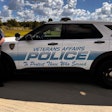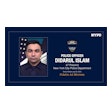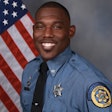Female officers have made great strides since the days of being relegated to tasks that often made them little more than secretaries with badges. Female sergeants, captains, and chiefs are not unusual, if not as prevalent as males in such positions. And those bastions of male elitism such as SWAT and narcotics now count women among their ranks.
The intense controversy surrounding the Los Angeles Police Department's Officer Jennifer Grasso as potentially the first woman to join the agency's SWAT team shows both the progress women have made and how far they still have to go to gain acceptance in tougher police roles.
Getting the plum assignments has clearly been a struggle for women over the years. A detective since 1992, Jane Harmer of the Boulder (Colo.) Police Department remembers when women could only investigate crimes against children and sexual assaults. "It took a long time for women to be thought of [as fit] to be put into roles like homicide investigators, the hot assignments," says Det. Harmer. "That is probably the one thing that has really driven me crazy about being a woman in policing."
Proving Yourself
Women still have a hard time breaking into certain details. And despite the progress many agencies have made, most female officers still feel the need to prove themselves every day, regardless of their rank or level of success.
"When I first started out 17 years ago it was definitely a challenge being a woman," says Master Police Officer Beth Lavin of the King County (Wash.) Sheriff's Office, "because you feel like you have to go out there and fight with somebody to prove to the guys you can handle yourself and you're not 'one of those wimpy female officers.'"
Harmer also felt that demonstrating physical prowess and outstanding tactics was important in garnering respect at her department. Although Boulder PD is progressive and supportive of female officers, she couldn't shake the need to prove her mettle. "If I failed or did poorly, I felt someone would be over my shoulder saying, 'See, you don't deserve this, you don't belong here.'"
Such feelings don't dissipate after a few years on the job. Capt. Michelle Hummel of the Charlotte-Mecklenburg (N.C.) Police Department says, "For each position you go to, it's almost like you're starting over. You're proving yourself all over again each time you get promoted or go to a new assignment."
Pressure to succeed and gain respect is compounded by officers' desire to not let other female officers down. In such a heavily male-dominated field, every woman feels she holds the responsibility of representing all women throughout the entire profession on her shoulders. Women in the upper ranks are in the spotlight even more.
"Every time a female sergeant takes a position in training, for example, and takes herself out of the hot position, I feel like, 'Oh no, there goes another female off of the street,'" says Harmer.
Public Appearance
Convincing the public to look beyond gender and respect a woman's authority as a police officer is also an uphill battle. And it's not always clear how to win.
Citing a landmark study that showed convicted cop killers chose targets based on an unkempt appearance, Officer Lori Connelly of the Phoenix Police Department firmly believes that looking professional goes a long way toward giving people the impression that you're on your game, and that is even more important for a female officer. "My boots are always shined and my uniform is always pressed, my brass is always polished, my hair is always well groomed," Connelly says. "Because I know the second I get out of that car that person is already making a judgment about me."
But beyond shiny boots, female officers themselves disagree on what makes for a professional appearance.
"Unfortunately, there are some female officers out there that are lazy," says Lavin. "They come to work with long nails and lots of makeup on and don't want to handle tough calls." Of course not everyone who wears makeup is lazy. Many officers count manicured nails as part of their professional appearance that demonstrates attention to detail.
Sgt. Betsy Brantner Smith of the Naperville (Ill.) Police Department, who is a size four and wears fake nails herself, emphasizes that appearances can be deceiving, even to her. "Right now we've got a recruit who's five-feet tall, 24, and looks like the head of the pom squad," she says. "But she's a single mom and no one's going to stand between her and her getting home to her little girl at night. When it comes time to get tough, oh, boy... no one's going to be tougher than her."
Female officers would be remiss not to use their femininity to their advantage, however.
"So many times being a female has been a huge benefit. But it's how you work it, too," says Connelly. As a woman, she's found that she commands respect from the Hispanic men in her jurisdiction whose culture emphasizes being polite to women. This has come in handy with belligerent drunk drivers who won't comply with male officers' requests. Once Connelly arrives, the DUI suspects fully cooperate.
But Connelly is confused by people's perceptions of what makes a female officer acceptable. She's had a man say he would talk to her only because she was straight. "I've had other people who didn't want anything to do with a straight female officer, but would talk to a female officer that they perceived as a lesbian," Connelly says.
Lavin of the King County Sheriff's Office has had similar experiences. The fact that she is a lesbian herself can be a benefit or a negative, depending on the situation.
"One time I went to a domestic violence call and it was two women," Lavin says. "We had to make an arrest, and the female suspect said, 'You just arrested me because you like my girlfriend.' And I said, 'No, it's because you hit her.'"
Communication and Use of Force
Female officers often bristle at the idea of their tactics being different from those of men, but they agree that for most women, communication is their first line of defense.
Women are sometimes criticized for talking too much, especially in the academy. But a tendency to rely on communication skills without resorting to violence when possible can be a very good trait.
"I think women have a more calming effect on a difficult situation," says Harmer of Boulder PD. "Our first choice is to try to negotiate or talk a person down as opposed to going hands on. I think we do a better job of de-escalating a situation in some cases."
When it comes to use of force, female officers are divided on the subject. They react differently to the suggestion that women may use force more quickly on the job.
"Bullshit," says Harmer. "We're absolutely less inclined to use force. And I'm not talking about lethal force. Women are more inclined to use communication and then force at the last minute, unless you have to."
While Connelly agrees that she usually uses communication to deescalate a situation, there are times when force is necessary quickly, especially because of her petite frame. "Being a smaller female, in our policy it's considered justified that I escalate use of force when someone is significantly larger than me," she says. "Sometimes it's just necessary."
Even admitting the necessity to bring force against a suspect because he is bigger and more dangerous can be difficult for female officers. When an intoxicated 250-pound man charged Brantner Smith and tried to grab her gun, she had to use immediate force. And she had to report the reasons for her actions, including a breakdown of her statistics next to the suspect's. "Believe me, I didn't want to put my height and my age and all that stuff, but I did," she says.
Of 45 officers at Lavin's precinct 17 are female. Sometimes the entire shift is staffed with female officers. "People joke around and call it the broad squad or Cagney and Lacey," says Lavin. "But you know, we take care of business."
Despite confidence in her abilities to communicate and escalate if necessary, Lavin is also aware of her own limitations.
"When I first started off I tried to be superwoman and go first. But in today's world you just can't be superwoman. Safety is number one, whether you're male or female."
Family vs. Career
Family obligations can be a double-edged sword for female officers. When it comes to dividing up their time, they can get guilt from both sides.
"I still get crap when I have to take time off to take care of my kids," says Connelly of Phoenix PD. "And as a woman it's expected I do it to take care of them or I'm a bad mom, but then they say that I can't be counted on because I drop everything to take care of my kids."
Connelly sometimes fudges the truth to minimize criticism for taking days off to spend time with her children. "I never lie," she says, "but if some busybody asks why I took Monday off I'll sometimes tell people in general, 'I had an appointment,' even if that appointment was a field trip."
Vacation days are one thing. But devotion to family often forces female officers to make tough career decisions, even turning down coveted or exciting assignments women would otherwise relish working. It's often not an easy choice.
"I myself have taken positions that were not as glamorous to get weekends off so I can spend them with my family," says Harmer. "Sometimes I regret not going for a promotion," she admits. "But then you do what everybody does, you get yourself in check and say, Come on, what's your priority?"
Brantner Smith agrees. She turned down a promotion to lieutenant because it meant she could spend more time with her family, and she's glad she did. But while police work often keeps her from attending track meets and other school events, it also allows her to relate to her children in an unusually frank way. For example, with what she calls "stupid teenage girl story time," she tells her 13- and 14-year-old daughters about calls involving teenage girls' bad decisions, in a lesson of what not to do. "You have to walk a fine line because you don't want your kids to be paranoid lunatics," says Brantner Smith. "But we can make them strong. And we can inform them."
When it comes to making important career decisions, Hummel emphasizes the fact that maintaining one's own priorities, whatever they may be, is essential to personal happiness and being successful in all aspects of life. "I haven't regretted the decisions I've made because I've done what I think is best for me, my family, and the organization," she says.
[PAGEBREAK]
Finding Female Support
While female officers share many of the same concerns and challenges, it's often difficult to find support among fellow officers. You'd think that women would band together, but in an effort to make their own name they often sabotage other female officers' careers.
"Some hold back and don't give other females the tools to get better, to strive to be a better officer," says Parole Officer Jane Crutchfield of the State of Ohio. "That's something I'd like to see change. In our position, we need to come together and encourage each other more."
Connelly agrees. When she started out in law enforcement she found that many of her fellow female officers deemed her untrustworthy because she looked feminine and wasn't overly willing to fight suspects. They mistakenly felt she wouldn't be able to back them up. "A lot of the other women were mean to me because they perceived me as a girly girl," she says.
Regardless of appearances, many female officers see other women as competition. When former police officer Lisa Lockwood was accepted onto her agency's SWAT team, other female officers gave her the cold shoulder. "I just wasn't appreciated or congratulated by the females," she says. "Sometimes silence can tell you a lot more than saying something."
For these reasons, women's organizations made up of officers looking for solidarity can be good networking and support tools for female officers. But many women shy away from them because of the possible negative connotations. "My assumption is they're afraid they might get a reputation that they have a manhater attitude or a different sexual preference," says Lavin, director for the 2009 International Association of Women Police Conference that will be held in Seattle. "But it's not about burning your bra. It's a sisterhood," she says.
Charlotte-Mecklenburg PD provides mentors for all officers upon entering the academy. And a female-only mentoring network is also available. Capt. Michelle Hummel of the agency's Street Crimes Division sees the value of mentoring, but has reservations about the women-only group. "An unfortunate side effect is that it builds up a wall between men and women, which is not what we're trying to do," she says.
Brantner Smith believes mentoring can be greatly beneficial to new recruits if it's done the right way. She's aware of the perception that women's organizations are separatist. And she's very critical of any groups that attack the male gender wholesale.
While women can hurt each other, they can also be their own worst enemies. Brantner Smith feels female mentors who have been there could help save rookies from themselves. "I tell woman recruits, avoid drama and don't talk about your personal life. Go to work and work." She believes one of the most important lessons female recruits can learn is that they're going to face adversity. "Women like fairness, they like consensus. But life ain't fair and neither is police work."
Learning to Cope
"I think it's easier for women to be police officers and to deal with stress because we express ourselves, and it's more acceptable for us to express ourselves," says Harmer. "We talk to each other and we don't hold things in. I've seen guys where it just ripped them apart because they are unable to let go of that part of their job."
Humor is also essential in handling the stressors of the job.
"I get a lot of, 'Oh, please, frisk me.' I wish I had a dollar for every time I've heard that," says Connelly. "Sometimes I tell them 'Maybe, but put the beer down first.' That's one of my favorite responses," Connelly laughs. "You have to have a sense of humor because you don't know what the public's going to tell you."
Officers also never know what kind of call they might have to respond to next. In a field where you see such atrocities as babies dying at the hands of abusive parents, it's sometimes easy to fall into despair.
"For people who are dealing with death and violence all the time, there needs to be that light side," says Lockwood.
Harmer has developed several coping mechanisms to handle the stress of her heavy homicide caseload. "After 20-plus years in this business, I know my releases: exercise, being able to communicate with my significant other about how I'm feeling, and spending time with my family."
Don't Lose Yourself
Maintaining a balance between one's identity as a woman and as a police officer is never going to be easy. Knowing this, Sgt. Stefani Gombar of the Phoenix PD cherishes one piece of advice she received in the academy from a female officer: "Don't lose yourself." Her advice to female officers is to recognize and take advantage of their strengths as women. "I just think that we need to remember that we're women, and although we're doing a job that is predominantly male, we still need to maintain our femininity and use that to our advantage toward the community and ourselves," says Gombar. "We see things very differently than men, and that can be a positive."
Maintaining a good sense of humor and sticking to personal priorities are also important in sustaining a career in law enforcement. But the tug-of-war can't be denied, even when accepting praise.
Lavin appreciates when people come up to her and say, "That's so cool that you're a female police officer." But when asked how she would react to someone telling her she had done a good job for a woman her exasperated response is, "Good grief."
In January 2008, POLICE Magazine launched a year-long article series focusing on the “state of American law enforcement.” If you’d like to read the other chapters, click on the links below.
Chapter 1: The Thinning Blue Line. Law enforcement agencies nationwide are competing for a dwindling population of recruits.
Chapter 2: The Blue Mosaic. Policies meant to diversify law enforcement agencies have changed police demographics and will continue to do so in the future.
Chapter 3: Teaching to the Test. Does law enforcement training focus too much on qualifying and not enough on skills that can help you win fights?
Chapter 4: A Love-Hate Relationship. Most people only meet an officer when they are arrested, questioned, or cited. That makes it hard for them to like cops.
Chapter 5: Can the Average Cop Thrive in the Age of Specialization? The generalist cop is part of a dying breed, which means many of today's officers will need to excel at a specialty.
Chapter 7: Working on the Front Lines. The patrol officer is the backbone of American policing, but a lot of agencies don’t want to admit it.
Chapter 8: SWAT: Breaking the Mold. Agencies nationwide model their tactical teams on LAPD SWAT. So what does it mean if that unit changes its policies to be more politically correct?
Chapter 9: Stopping the Next 9/11. Improvements in intelligence gathering, training, and equipment give you a good chance of preventing the next attack and saving lives if it happens.
Chapter 10: Rules of Engagement. Today’s law enforcement officer is the best trained and best equipped cop in history, so why do policy makers think you have the judgment and intellect of children?
Chapter 11: Gangster Nation. Big city street gangs have taken root in small town America, bringing mayhem to Main Street.
Chapter 12: Damned If You Do, Damned If You Don't. When a cop uses - or doesn't use - a less-lethal weapon in contemporary America, there can be hell to pay.















